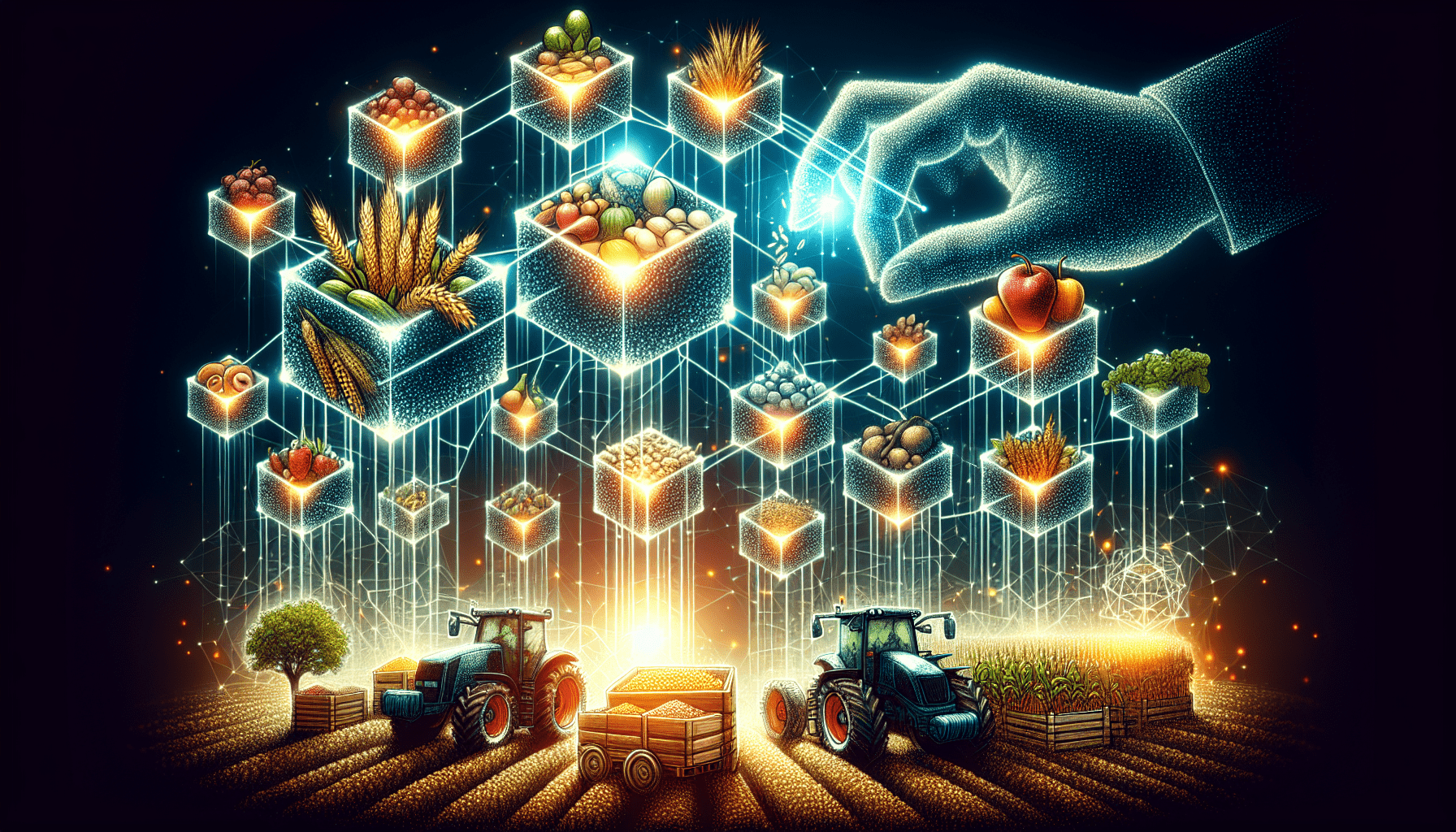In the world of agriculture, ensuring the traceability of products has always been a complex and challenging task. However, with the rapid advancement of technology, a promising solution has emerged: blockchain. This groundbreaking technology has the potential to revolutionize the industry by providing an immutable record of every step in the supply chain, from seed to plate. By harnessing the power of blockchain, farmers, distributors, and consumers can have unprecedented transparency and accountability, ensuring the safety and authenticity of agricultural products. Join us as we explore the development of blockchain for traceability in agriculture and how it is reshaping the future of farming.
Benefits of Blockchain in Agriculture
Increase in food safety
Blockchain technology has the potential to greatly enhance food safety in the agriculture industry. With blockchain, every step of the food production and distribution process can be securely recorded and verified. This means that information such as the origin of food products, the techniques used in cultivation, and the handling conditions during transportation can all be tracked and verified. By providing an immutable and transparent ledger, blockchain ensures that consumers have access to accurate and up-to-date information about the safety of the food they consume.
Enhanced supply chain transparency
One of the key benefits of blockchain technology in agriculture is the ability to increase supply chain transparency. Agriculture supply chains can be complex, involving multiple stakeholders such as farmers, processors, distributors, and retailers. With blockchain, each participant in the supply chain can have real-time visibility into the movement of products, ensuring transparency and accountability. This can help prevent fraud, improve efficiency, and build trust among stakeholders.
Improved data accuracy
Blockchain technology has the potential to significantly improve data accuracy in the agriculture industry. Traditional record-keeping systems are prone to errors, manipulation, and data loss. However, with blockchain, every transaction and piece of information is stored in a decentralized ledger. Once recorded, the data cannot be altered or tampered with, ensuring the integrity and accuracy of the information. This can help in various aspects of agriculture, such as regulatory compliance, certification processes, and insurance claims.
Efficient product tracing
Product tracing is a crucial aspect of agriculture traceability, especially in cases of food recalls or disease outbreaks. With traditional tracing methods, identifying the origins of contaminated products can be a time-consuming and error-prone process. However, with blockchain technology, the entire history of a product can be easily traced from farm to fork. This allows for quick and precise identification of contaminated products and swift action to mitigate risks. Efficient product tracing can not only save lives but also minimize the economic impact of food safety incidents.
Challenges in Agriculture Traceability
Complex supply chain networks
Agriculture supply chains are often complex, involving numerous stakeholders, multiple handovers, and diverse processes. This complexity presents a significant challenge for traceability efforts as it can be difficult to accurately capture and record the movement and handling of products. Implementing blockchain technology in such complex supply chain networks requires close collaboration and coordination among all participants to ensure the accurate and timely recording of data.
Lack of interoperability
Another challenge in agriculture traceability is the lack of interoperability between different systems and technologies used by different stakeholders in the supply chain. Each participant may have their own data management systems and processes, making it difficult to integrate information across the supply chain. Blockchain solutions need to address this challenge by providing interoperability layers that enable seamless communication and data exchange between different systems.
Data privacy concerns
With the adoption of blockchain technology, concerns about data privacy and security often arise. While blockchain ensures data integrity and transparency, it also raises questions about the privacy of sensitive information. In the agriculture industry, there may be a need to protect confidential information, such as proprietary farming techniques or trade secrets. Blockchain solutions must incorporate mechanisms to address these concerns and ensure that sensitive information is securely stored and accessed only by authorized parties.

Introduction to Blockchain Technology
Explanation of blockchain
Blockchain is a decentralized digital ledger that records and verifies transactions across multiple computers, creating a permanent and transparent record of data. Unlike traditional centralized databases, blockchain eliminates the need for intermediaries and provides a secure and transparent way to conduct transactions and store information. Each transaction, or block, is added to a chain of previous transactions, forming a chronological and immutable record.
How blockchain works
Blockchain technology works through a consensus mechanism, where multiple participants in the network agree on the validity of transactions. Once a transaction is verified, it is added to a block and linked to the previous block, creating a chain of blocks. This ensures the integrity and immutability of the data, as any attempt to modify a block would require changing all subsequent blocks in the chain.
Key features of blockchain
Blockchain technology is characterized by several key features that make it suitable for agriculture traceability. Firstly, blockchain provides immutability, as once a transaction is recorded, it cannot be changed. Secondly, blockchain is transparent, allowing all participants in the network to have visibility into the transactions and data. Thirdly, blockchain is decentralized, eliminating the need for a central authority and enabling peer-to-peer transactions. Finally, blockchain provides security through encryption and cryptographic algorithms, ensuring the integrity and confidentiality of the data.
Blockchain in Agriculture Traceability
Use cases of blockchain in agriculture
Blockchain technology has a wide range of use cases in agriculture traceability. For example, it can be used to track the provenance of agricultural products, ensuring their authenticity and preventing counterfeiting. Additionally, blockchain can enable certification and quality assurance processes, ensuring that products meet specific standards and regulations. Furthermore, blockchain can be utilized for tracking and monitoring supply chain logistics, improving efficiency and reducing waste.
Traceability benefits of blockchain technology
The adoption of blockchain in agriculture traceability offers numerous benefits. Firstly, it provides a secure and transparent record of the movement and handling of products, allowing for quick and accurate tracing in case of recalls or disease outbreaks. Secondly, blockchain enhances trust and accountability among stakeholders by providing real-time visibility into the supply chain and preventing fraud and counterfeit products. Finally, blockchain increases the efficiency of record-keeping and reduces administrative burdens through automation and digitization.
Integration with existing systems
In order to maximize the benefits of blockchain technology, it is crucial to integrate it with existing systems and technologies used in the agriculture industry. This integration can be achieved through application programming interfaces (APIs) and data standardization. By connecting blockchain platforms with existing databases and systems, participants in the supply chain can seamlessly exchange information and leverage the benefits of blockchain without disrupting their current operations.

Building a Blockchain Traceability System
Choosing the right blockchain platform
When building a blockchain traceability system, it is important to choose the right blockchain platform that meets the specific needs of the agriculture industry. Factors to consider include scalability, data privacy features, consensus mechanisms, and compatibility with existing systems. It is also crucial to evaluate the governance and sustainability of the chosen platform, as well as the community support and developer ecosystem. Engaging with industry experts and conducting thorough research can help in making an informed decision.
Designing the traceability framework
Designing a traceability framework involves defining the data to be recorded, the participants involved, and the processes for data capture and verification. It is important to identify the critical control points and determine how blockchain technology can be utilized to enhance traceability at each point. Additionally, the framework should incorporate mechanisms for audits and inspections to ensure the accuracy and reliability of the recorded information. Collaboration among stakeholders and industry experts is key in designing an effective traceability framework.
Implementing smart contracts
Smart contracts are self-executing contracts with the terms and conditions of the agreement directly written into code. They can automate and enforce the execution of transactions and provide transparency and accountability. In agriculture traceability, smart contracts can be used to automate the verification and validation of data, trigger actions in case of non-compliance, and facilitate the exchange of value. Implementing smart contracts requires a thorough understanding of the business processes and legal framework to ensure the desired outcomes are achieved.
Ensuring Data Integrity and Security
Encryption and data protection
Ensuring the integrity and security of data is crucial when implementing a blockchain traceability system in agriculture. Encryption plays a vital role in protecting sensitive information and preventing unauthorized access. All data stored on the blockchain should be encrypted using cryptographic algorithms, making it virtually impossible for unauthorized individuals to decrypt and manipulate the data. Additionally, proper access controls and authentication mechanisms should be implemented to ensure that only authorized parties can access and modify the data.
Decentralization vs. centralized solutions
One of the key advantages of blockchain technology is its decentralized nature, which eliminates the need for a central authority and provides resilience against single points of failure. However, in some cases, centralized solutions may be more suitable, especially when it comes to handling sensitive information or ensuring compliance with regulations. The decision to adopt a decentralized or centralized approach should be based on a careful analysis of the specific requirements and risks associated with the traceability system.
Permissioned vs. permissionless blockchains
Blockchain networks can be categorized as either permissioned or permissionless, depending on the level of access and control granted to participants. Permissioned blockchains restrict access to a predefined set of participants, ensuring that only authorized parties can participate in the network. Permissionless blockchains, on the other hand, allow anyone to join and participate in the network. In agriculture traceability, the choice between permissioned and permissionless blockchains depends on factors such as the desired level of privacy, the need for control, and the regulatory environment.

Collaboration and Standardization Efforts
Industry collaborations for blockchain traceability
Collaboration among stakeholders is crucial for the successful implementation of blockchain traceability in agriculture. It is important for farmers, processors, distributors, retailers, and regulators to work together to define industry standards, develop common frameworks, and establish interoperability. Industry collaborations can help in addressing challenges such as data sharing, system integration, and governance. By sharing knowledge and resources, stakeholders can accelerate the adoption and implementation of blockchain traceability solutions.
Establishing data standards and protocols
In order to achieve seamless data exchange and interoperability, it is essential to establish standardized data formats, protocols, and interfaces. Data standards ensure that information is recorded and shared in a consistent and compatible manner across different systems and platforms. Standardization efforts should involve input from all relevant stakeholders to ensure that the standards meet the specific needs and requirements of the agriculture industry. Industry associations, regulatory bodies, and international organizations play a significant role in establishing and promoting data standards in agriculture traceability.
Interoperability challenges and solutions
Interoperability is a key challenge in blockchain traceability, as different stakeholders may use different systems and technologies. Interoperability refers to the ability of different systems to communicate and exchange data seamlessly. To address this challenge, interoperability frameworks and protocols need to be developed. Application programming interfaces (APIs) can be used to bridge the gap between different systems, allowing for the secure and efficient exchange of data. Interoperability testing and certification programs can also help ensure the compatibility and interoperability of blockchain traceability systems.
Implementation Challenges and Adoption Barriers
Cost considerations and scalability
Implementing blockchain traceability systems in agriculture can come with significant costs, especially in terms of infrastructure, development, and maintenance. The scalability of blockchain technology also needs to be carefully considered, as the agriculture industry involves large volumes of data and a vast number of transactions. It is important to conduct a thorough cost-benefit analysis and evaluate the return on investment before implementing blockchain solutions. Collaboration and sharing of resources can help reduce costs and maximize the scalability of blockchain traceability systems.
Lack of technical expertise
The successful implementation of blockchain traceability systems requires technical expertise in various domains, including blockchain development, data management, cybersecurity, and system integration. However, there is a shortage of skilled professionals with the necessary knowledge and experience in the agriculture industry. To overcome this challenge, education and training programs should be developed to build a skilled workforce capable of designing, implementing, and maintaining blockchain traceability systems. Collaboration with academic institutions and industry associations can help in developing relevant training programs.
Resistance to change
Resistance to change is a common barrier to the adoption of new technologies, including blockchain. Implementing blockchain traceability systems involves significant changes to existing processes and workflows. This can be met with resistance from stakeholders who may be comfortable with traditional methods or skeptical about the benefits of blockchain. To overcome resistance, it is important to communicate the value proposition of blockchain technology, involve stakeholders in the design and development process, and address any concerns or misconceptions through education and awareness campaigns.

Real-World Examples of Blockchain Traceability
Blockchain pilot projects in agriculture
Several pilot projects have been conducted to explore the potential of blockchain traceability in agriculture. For example, the World Wildlife Fund (WWF) collaborated with BCG Digital Ventures to develop a blockchain-based traceability system for tuna fishing. The project aimed to increase transparency and eliminate illegal fishing practices by recording and verifying the entire journey of tuna from ocean to market. Similarly, IBM partnered with Walmart, Carrefour, and other companies to pilot blockchain solutions for tracking the provenance of food products such as mangos, pork, and chicken.
Success stories and benefits achieved
Blockchain traceability has already shown promising results in the agriculture industry. By improving supply chain transparency and enhancing traceability, blockchain has helped prevent fraud, reduce food waste, and increase consumer trust. For example, in the seafood industry, blockchain has helped eliminate counterfeit products and ensure the sustainability of fishing practices. In the fruit and vegetable sector, blockchain has enabled faster and more accurate recalls, minimizing the impact of foodborne illnesses. These success stories demonstrate the tangible benefits that blockchain technology can bring to agriculture traceability.
Lessons learned and future prospects
The implementation of blockchain traceability in agriculture has provided valuable lessons and insights. It has become evident that collaboration and standardization are crucial for the success of blockchain initiatives. By working together and establishing common frameworks, stakeholders can overcome interoperability challenges and ensure the widespread adoption of blockchain technology. Looking forward, the future of blockchain in agriculture traceability is promising. As the technology matures and more success stories emerge, we can expect to see increased adoption and integration of blockchain solutions in the agriculture industry.
Conclusion
The potential of blockchain technology in agriculture traceability is vast. By leveraging its benefits such as increased food safety, enhanced supply chain transparency, improved data accuracy, and efficient product tracing, blockchain can revolutionize the agriculture industry. However, there are challenges to overcome, including complex supply chain networks, lack of interoperability, and data privacy concerns. Through collaboration, standardization, and addressing implementation challenges, the widespread adoption of blockchain traceability in agriculture can be achieved. The future of blockchain in agriculture looks promising, with real-world examples already demonstrating the benefits and potential of this transformative technology.

